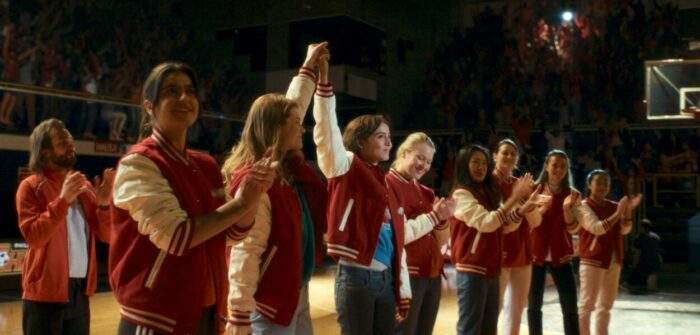In the world of French soccer, Marinette Pichon appears to be a name synonymous with nigh-impossible achievement. She’s held a record for the most goals scored for the French national team, with 81 goals over the course of nearly 100 games, becoming virtually the best striker in France. With her recruitment for the Philadelphia Charge, she became the first female French soccer player to contractually expand her career internationally, receiving several accolades during her time on the team. All of this achievement and more gets framed amid her incredibly tumultuous personal life—one that was frequently plagued by her alcoholic and violently abusive father, countless instance of harassment from teammates, as well as the complex struggles that arose with her identity as a queer person playing a largely heteronormative sport—to create a story of significant triumph, even as she retired at the age of 31 as a result of her indignant anger towards the countless inequities surrounding women’s soccer in France.
Having said all that, with the nearly 170 words contained in this above paragraph, I’ve described just about the entirety of what occurs in Virginie Verrier’s Marinette with virtually the exact same degree of gravitas and emotional investment— a biopic of Pichon’s (Raw and Titane star Garance Marillier) life which, in its attempt to pack all of her achievements, all of the turmoil of her personal tumult, and all of the significance that lies behind the culmination of it all, makes the critical mistake of attempting to frame all of it in just about 90 minutes total. What could have been a deeply emotional story about a queer woman soccer player defying all the odds to cement her place in French sports legend instead becomes a Wikipedia-styled checklist in visual form, only barely anchored by Marillier’s dedication to the performance and the film’s occasional moments of genuine emotional insight.
It’s quite difficult to emphasize how exactly Marinette goes about moving through different facets of Pichon’s life with such intense speed without bringing attention to the degree of confusion and emotional whiplash such a hasty approach brings to multiple moments. Marinette seems to start out straightforwardly enough, as it essentially begins right at Pichon’s childhood and burgeoning interest in soccer from an incredibly young age, depicting her first years as a soccer player in a typical broad-strokes fashion. However, as Pichon gradually progresses through key stages of her career, and undergoes a series of increasingly harrowing events involving her father and various tormentors she encounters along her journey, hardly any scenes that typically would carry heavy significance in another biopic of this breed—multiple pivotal games in Pichon’s international career, a car accident her mother got into that sent her into a coma, an nauseatingly horrific act of violence that her father commits, her marriage to wheelchair basketball player Ingrid Moatti, etc.—get their full due, and it leads to significant emotional whiplash when the heaviness of some of these moments, as well as their personal significance on Pichon, only gets immediately glossed over in a heartbeat.

Perhaps most demonstrative of the lack of justice done to these moments by Marinette‘s breakneck pacing is how several World Cup games Pichon played in—World Cup games—are relegated to only a handful of shots of the French team struggling, or Pichon trying to give locker pep talks to her fellow teammates; most bafflingly, one of them merely focuses on their coach’s face in a Jaws-esque dolly shot of dread as the losing score pops up on the screen with a soft thud in one of the film’s countless superimposed intertitles. The omission of these games’ greater details particularly serves as emblematic of Marinette‘s greater problems on a structural level; everything about Pichon’s life is given a nearly-equal amount of space, and as a result, hardly any of the most important moments of the story seem to be of any consequence, or at the very least, feel as if they have any meaningful consequence.
What makes such a hasty approach most disappointing is that Marillier’s skill as a performer could have had a proper opportunity to shine through playing a person as prolific and historically pivotal as Pichon, but we rarely get the opportunity to get a proper glimpse at the extensive training she did to emulate Pichon’s soccer skills, nor do we ever get the chance to see her use the full emotional range to a point where it would potentially be deeply affecting. And it’s not like the film is technically inept, either—several cinematographic techniques as used over the course of the film by DP Xavier Dolléans are engaging enough to keep things visually interesting, but one wonders what exactly they’re being used for when the scenes in the film and the coverage they ask for never really allow the technicalities to be flexed beyond presenting things exactly as they are for the brief duration they’re on screen.

Marinette is a film whose disorientation can only leave disappointment by its conclusion. There is something to be said about sports biopics—or biopics in general—that are so reverent to their subjects that they focus intently on their highlights and biggest moments. Something, however, must also be said about biopics that are so deeply fixated on the bigger picture of their subjects’ career and the impact, that the minute details are completely glossed over in favor of giving the audience everything, in a story that may have been better served by a capsule-like format, or perhaps even the added benefit of 30 to 40 minutes for a two-hour-long runtime. By the time Pichon, as depicted in the film, confronts the reality of her situation—that sports for women in France are plagued with stigmas and systemic problems that prevent their players from stacking up to other countries’ women soccer players worldwide, and that there is no escape from it without significant reform—the weight of the decisions that follow that reckoning is once again subject to the blisteringly fast pace that the film has gone out of its way to operate on in the hour that preceded it… and everything starts to feel like more the same once more.




